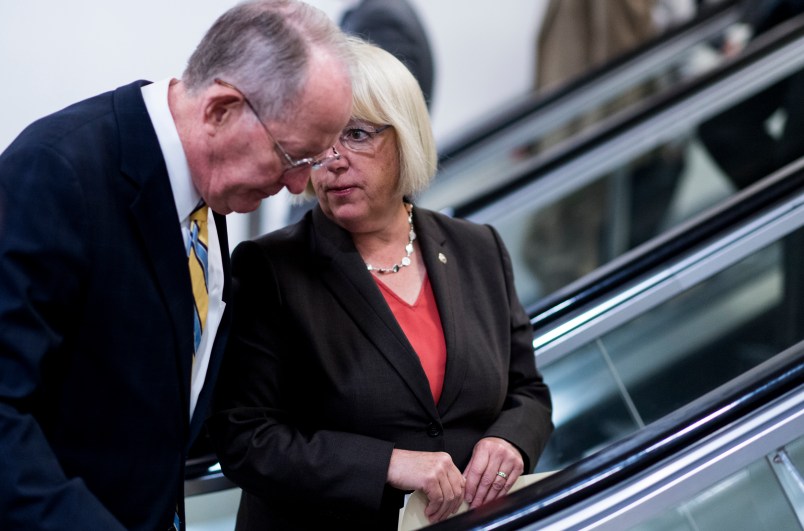Tierney Sneed contributed reporting.
President Donald Trump’s decision last week to terminate billions in subsidies to insurance companies that are required under the Affordable Care Act, lit a new fire under some members of Congress who have been working for months to guarantee the subsidy payments and protect the individual market from the White House’s whims.
On Tuesday, Sens. Lamar Alexander (R-TN) and Patty Murray (D-WA) announced a deal that would fund the cost-sharing reduction payments for two years, make it easier for states to waive some health care regulations, and restore the budget for open enrollment outreach Trump gutted earlier this fall.
A Democratic aide confirmed to TPM that the bill would restore $106 million in outreach funding for the Affordable Care Act, more than was spent promoting enrollment under the Obama administration last year. But a GOP aide clarified that this outreach budget would go to states as grants and would not be controlled by the federal government.
Alexander told reporters that the bill also amends the definition of affordability in the rules for states seeking 1332 waivers to get out of some of Obamacare’s regulations. Exact text of the measure has not yet been released, but Alexander described the broad outlines: “It does not change essential health benefits,” he said. “It does not change the requirement for pre-existing conditions. There are protections there that protect people, but at the same time we give significant flexibility to states.”
After attempting to sell the deal to his colleagues in a Republican luncheon on Tuesday, Alexander told reporter he is “encouraged by the consensus of support I’ve received, including from President Trump,” but warned that reaching a bipartisan deal was the first step of many.
Sen. Mike Rounds (R-SD), a supporter of the measure, told reporters that there is not yet a commitment from GOP leaders in the Senate or House to support the bill or even hold a vote on it. “If we get enough co-sponsors on the bill, we can present it to leadership and move forward,” he said. “This is an opportunity to actually take care of a problem.”
Alexander name-checked the three Republicans who brought down Obamacare repeal bills this year—Sens. John McCain (R-AZ), Lisa Murkowski (R-AK) and Susan Collins (R-ME)—as being on board. Democratic Senate leaders also voiced full-throated support for the deal on Tuesday, saying it includes “some very significant anti-sabotage provisions.”
“The president has been sabotaging [the ACA], and the agreement would undo much of that sabotage,” said Senate Minority Leader Chuck Schumer. “So overall we are very pleased with this agreement.”
President Trump, who was in the middle of a Rose Garden press conference when news of the deal broke, also seemed to signal his support when asked about it by reporters: “It is a short term solution so that we don’t have this very dangerous little period, including dangerous period for insurance companies, by the way,” he said. “For a period of one year, two years, we will have a very good solution.”
But despite support on both sides of the aisle and potentially in the White House, the deal still faces an uphill battle.
On Monday, House Speaker Paul Ryan dumped cold water on the idea of restoring CSR payments, telling reporters: “Propping up Obamacare and just giving insurance subsidies to insurance carriers to keep a failing system propped up is not the answer.”
The influential Republican Study Committee issued its own negative assessment on Tuesday following Alexander’s announcement, further imperiling the deal’s change of passing the House.
Chairman @repmarkwalker: "The GOP should focus on repealing & replacing Obamacare, not trying to save it. This bailout is unacceptable." https://t.co/Sjooq9ituF
— RSC (@RepublicanStudy) October 17, 2017
“I’m hoping everybody understands how much resistance there is for funding these Obamacare markets that will never be self-sustaining,” said Sen. Ron Johnson (R-WI), who has been talking with House Republicans about an alternative plan. “It’s a very legitimate point of view from conservatives.”
Johnson and other conservatives did recognize, however, that Trump’s sudden termination of the CSR payments last week, just before open enrollment, is wreaking havoc in the health care system.
“Not funding CSRs cause premiums to increase and is literally costing American taxpayers more money,” he said. “That’s a hard little reality to get everybody to acknowledge, but it’s the truth.”
Negotiations between Alexander (R-TN) and Sen. Patty Murray (D-WA) on CSRs began months ago, with the goal of passing a bill by the end of September to prevent the Trump-fueled uncertainty from triggering massive insurance rate increases in 2018. But after the talks were sidelined for weeks as GOP leaders launched yet another failed bid to repeal Obamacare, Congress blew past that deadline, Trump cut off the CSR payments, and insurers significantly hiked their rates and threatened to drop out of the market altogether.
If Congress doesn’t act soon, Alexander cautioned, “up to 16 million Americans might live in counties without any insurance.”







Does this have to pass both Senate and House and can it override a trump veto?
So is Trump’s plan to be such a fucking asshole that he basically forces the Republicans to work with the Democrats to get things done? Maybe he IS playing three-dimensional chess after all…
This was always Congress’s responsibility. Obama only took over the CSRs because Congress wouldn’t do its duty to appropriate the funds for them.
This story is a little light on the details, but I trust Sen. Murray to understand who’s holding the cards here. This should play out like a Democratic rescue of the ACA, no matter how much Trump tries to take credit for forcing the issue.
He won’t veto. He’ll claim that his leadership forced them to take this step and he’ll take all the credit for personally moving their hands on the Ouija board.
Give the devil his due if he actually helped move the Senate . Now to get Ryan to do the same.